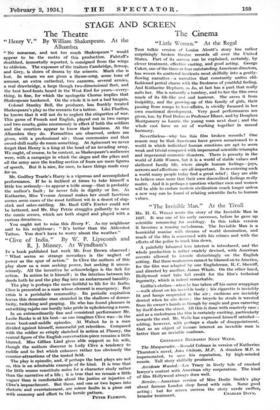The Cinema
"Little Women," At the Regal
Tars talkie version of Louisa Alcott's story has rather surprisingly broken theatre records all over the United States. Part of its success can be explained, certainly, by clever treatment, effective casting, and good acting- George Cukor, one of the three or four outstanding American directors, has woven its scattered incidents most skilfully into a gently- flowing narrative—a narrative that constantly unites old- fashioned period charm with the freshness of youthful feeling. And Katharine Hepburn, as Jo, at last has a part that really suits her. She is naturally a tomboy, and to her the film owes much of its life-like zest and humour. She saves it from insipidity, and the growing-up of this family of girls, their passing from romps to love-affairs, is vividly focussed in her own emotional development. Very good performances are given, too, by Paul Dukas as Professor Bhaer, and by Douglass Montgomery as Laurie, the young man next door ; and the whole cast have an air of working together in unusal harmony.
Nevertheless—why has this film broken records ? One reason may be that Americans have grown accustomed to a world in which individual human emotions are apt to seem weak and trivial compared with impersonal scientific triumphs and impersonal economic disasters. There is poverty in the world of Little Women, but it is a world of stable values and sheltered family life, where simple human feelings—joys, sorrows and affections—are all-important. In re-entering such a world many people today find a great relief ; they are able to believe once more that their own discredited feelings really matter. And it is perhaps a question whether men and women will be able to endure modem civilization much longer unless a new way can be found of relating scientific facts to human values.








































 Previous page
Previous page